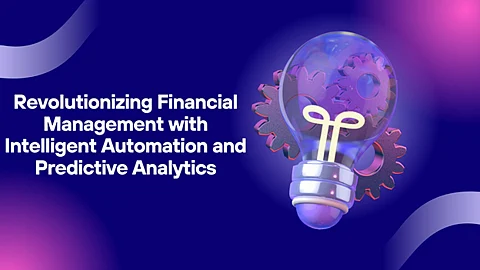Revolutionizing Financial Management with Intelligent Automation and Predictive Analytics
Financial management is undergoing a major transformation, driven by the integration of intelligent automation and predictive analytics. As businesses seek to streamline operations and enhance decision-making, cutting-edge Enterprise Resource Planning (ERP) systems are playing a pivotal role. This article explores how these innovations are reshaping traditional financial workflows, making them more efficient, accurate, and forward-looking. Vaishnav Yerram examines these emerging trends and their impact on modern financial operations.
The Shift to Intelligent ERP Systems
Traditional ERP systems were primarily designed for transaction processing and record-keeping. However, the latest advancements have introduced predictive analytics, machine learning, and robotic process automation (RPA), enabling organizations to transition from reactive financial management to proactive, data-driven strategies. By leveraging AI-powered forecasting tools, companies can better anticipate market fluctuations, optimize cash flow, and enhance financial reporting accuracy.
Predictive Analytics: A New Era in Financial Planning
Predictive analytics is changing the shape of financial forecasting using machine learning algorithms that analyze past data to reveal identifiable patterns. This greatly improves the prediction of cash flow, thus informing resource allocation for business. Studies indicate that predictive potential built into ERP systems can increase accuracy in forecasting by 42% while reducing the demand for working capital and financial risk. Further, by implementing predictive analytics, businesses can forecast revenue fluctuations, improve budgeting strategies, and prepare for possible financial challenges. Organizations have now become up to date with real-time integration data, enabling them to improve their forecasting models continuously for an assured accuracy in financial planning. The deployment of AI-powered insight also supports detecting new trends in markets that would otherwise be overlooked in a dynamic-viewing economy.
Real-Time Financial Insights and Decision-Making
The integration of real-time analytics has enabled financial teams to enjoy insights into the company's performance. This capability provides better decision-making because finance professionals can act quickly in response to arising risks and opportunities. It is estimated that real-time data processing reduces reporting cycle time by 76% and increases accuracy in inventory valuation by 89%. Besides this, these systems foster proactive risk management, allowing automatic detection of anomalies and predictive modeling, and easier inter-departmental collaboration on common dashboards and standardized metrics. With the implementation of real-time analytics, regulatory compliance is also enhanced through maintaining audit trails with integrity and verifiable data across all financial operations.
Robotic Process Automation: Streamlining Operations
RPA automates repetitive tasks like invoice processing, reconciliation, and compliance reporting whereby it transforms finance workflows. Already most organizations that have embraced RPA have reduced manual processing time by 65% and increased data entry errors by 92%. Improvements in this area are very important not only to improve efficiency but also free finance teams to work on strategic initiatives. Moreover, overtime costs have reduced significantly as a result of RPA implementation, along with a shifted resource allocation. Changing business needs can be dealt with quite easily, considering scalability, integration with already existing systems ensures seamless data flow and enhanced process visibility. High-end RPA now includes machine learning capabilities that will allow ongoing optimization of processes and more advanced automation scenarios...
Scenario Planning for Financial Resilience
Advanced ERP systems now include sophisticated scenario-planning tools that allow organizations to model various financial situations and assess potential outcomes. By incorporating AI-driven financial modeling, businesses can predict market shifts with 87% accuracy, improving their ability to navigate economic uncertainties. These capabilities support better strategic planning and risk mitigation. The integration of machine learning algorithms enables real-time adjustment of financial forecasts based on emerging market data, while advanced visualization tools help stakeholders better understand complex scenarios. Modern ERP platforms also facilitate collaborative decision-making by allowing multiple departments to simultaneously contribute to and analyze different planning scenarios, creating a more comprehensive and dynamic approach to financial strategy development.
Strengthening Compliance and Risk Management
Regulatory compliance continues to be a huge challenge for businesses because there are many broader jurisdictions in which they operate. The new automated compliance tool taking advantage of the latest ERP systems addresses the real-time detection of changes in regulatory requirements and compliance with financial standards. Reports indicate that organizations that use these tools have almost a 55% reduction in compliance-related costs and a 98.7% improvement in reporting accuracy.
Future Trends in ERP Financial Management
Year after year, there is an increment of 82% in the usage and implementation rates of cloud-based ERPs in organizations. New technologies are further improving the scope of ERP systems. Some of them include blockchain and AI-powered analytics, and integration with the Internet of Things (IoT). Increasing business investments in these areas will lead financial management toward becoming very agile and efficient with a predictive capability.
In conclusion, the combination of intelligent automation with predictive analytics in business ERP will usher in a new epoch for finance. The benefits available through such innovations will be increased efficiencies, accuracy, and strategic decision-making for the businesses using them. And as businesses mature, the use of ERPs in their finance operations will only increase, an aspect of the future where success will be engrained in insight driven by data and not by chance. Insights from Vaishnav Yerram into these transformational technologies showcases the huge potential they hold for modern enterprises.
.png)

